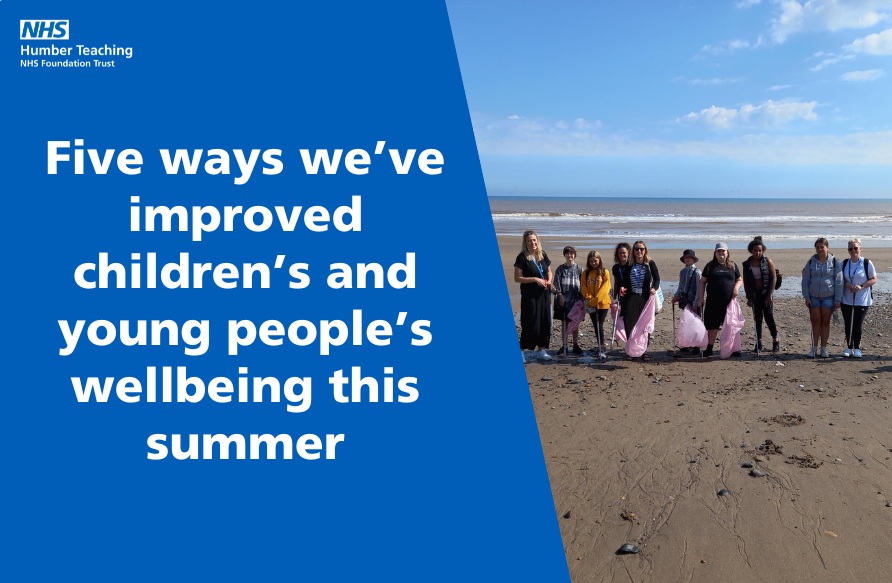Five ways we’ve improved children’s and young people’s wellbeing this summer
Published: 14 September 2023 to 31 December 2098

The summer holidays can be great, but for some young people it can be a lonely time, and some find it difficult to cope with change in their routine.
This year our Mental Health Support Team held a Summer Activities Group to support young people in Hull and East Yorkshire aged 13-15 years old.
Our Mental Health Support Teams work in schools and colleges to support children and young people with their mental health and emotional wellbeing.
The Summer Activities Group ran weekly throughout August led by our early intervention mental health support team (MHST) and was focused around the five steps we can all take to improving our mental health and wellbeing.
We’ve shared the experience of the group and included some top tips for how you can put the five steps into practice.
Read more about the five steps on the NHS website 5 steps to mental wellbeing - NHS (www.nhs.uk)
Step One: Connect
The young people met at a youth club to start to get to know each other. They took part in team building activities including tower building and human bingo to break the ice.
Step Two: Be active
We partnered with Tigers Trust, a charity which aims to make a difference to people’s lives by involving them in sport, to involve the young people in games like rounders, football and dodgeball.
Physical activity like this can support mental health and wellbeing by helping with:
- Sleep – exercise promotes better sleep quality.
- Improved mood – physical activity releases feel-good hormones that make you feel better in yourself and increase your energy levels.
- Stress management, anxiety or intrusive and racing thoughts – doing something physical releases cortisol which helps us manage stress. Being physically active also gives your brain something to focus on and can be a positive coping strategy for difficult times.
Read about exercise guidelines and find workouts that can improve your fitness https://www.nhs.uk/live-well/exercise/
Step Three: Give
The young people learnt the importance of giving back when they visited the coast to participate in litter picking exercises at Spurn Point, Hornsea and Withernsea sea front. This was the surprise hit of the programme and saw one young person fly a kite for the first time whilst others also took the opportunity to build sandcastles and swim in the sea.
Find out how you can volunteer on the gov.uk website https://www.gov.uk/government/get-involved/take-part/volunteer
Step Four: Take notice
One tool which can help to you to take notice of your surroundings is the practice of mindfulness. Research has shown that mindfulness mediates the relationship between nature and wellbeing. A visit to a local nature reserve provided an opportunity for the group to focus on their surroundings and learn how nature can be used as a coping strategy to relieve stress and relax.
A mindfulness walk used the 54321-grounding technique which taught the young people how to identify and focus on five things they could see, four things they could touch, three things they could hear, two things they could smell and one thing they could taste.
Find out more about mindfulness and it’s benefits here https://www.nhs.uk/mental-health/self-help/tips-and-support/mindfulness/
Step Five: Keep learning
Learning new skills can help with boosting self-confidence and raising self-esteem; helping you to build a sense of purpose and helping you to connect with others.
A residential at Melton Lodge, a woodland in the local area just outside of Swanland, offered an opportunity for the group to try new things including building campfires and making s’mores.
A sleepover under the stars was a memorable and everlasting experience for many of the young people involved.
What was the feedback?
We asked the practitioners what impact they felt the programme had on the service users and Chloe Beverley, Childrens Wellbeing Practitioner, told us:
“We have had lots of great feedback from the parents and carers of those who attended. Some of the young people initially experienced low levels of anxiety and found it difficult to meet new people.
The programme provided the opportunity for them get out of the house, meet others and engage in a range of fun activities, whilst learning important skills along the way.
One young person started the first session at the youth centre quiet, withdrawn and found it hard to interact with others. After coming each week, they made lots of friends and even managed to stay overnight for the residential. The young person came out of their shell, and it was lovely to see such a change”.
A parent of a service user said:
“My daughter has become a totally different person who is now full of confidence and has truly come out of her shell thanks to the teams help and support throughout the programme”. She has passed on her thanks and appreciation to the team tenfold.
To learn more about our early intervention Mental Health Support Team visit Mental Health Support Team Hull (mentalhealthhull.com)
- Summary:
This year our Mental Health Support Team held a Summer Activities Group to support young people in Hull and East Yorkshire aged 13-15 years old.
- Category:









